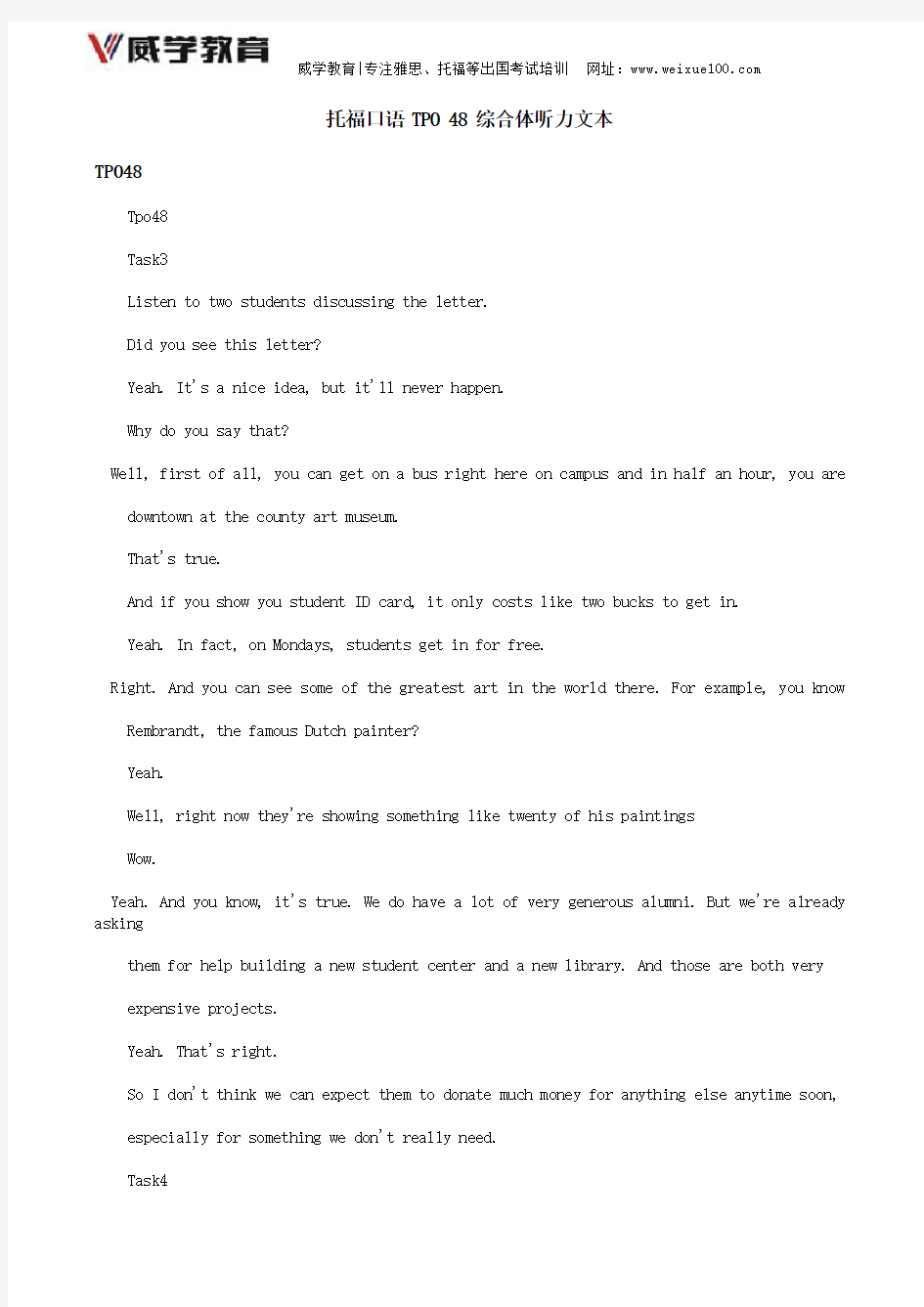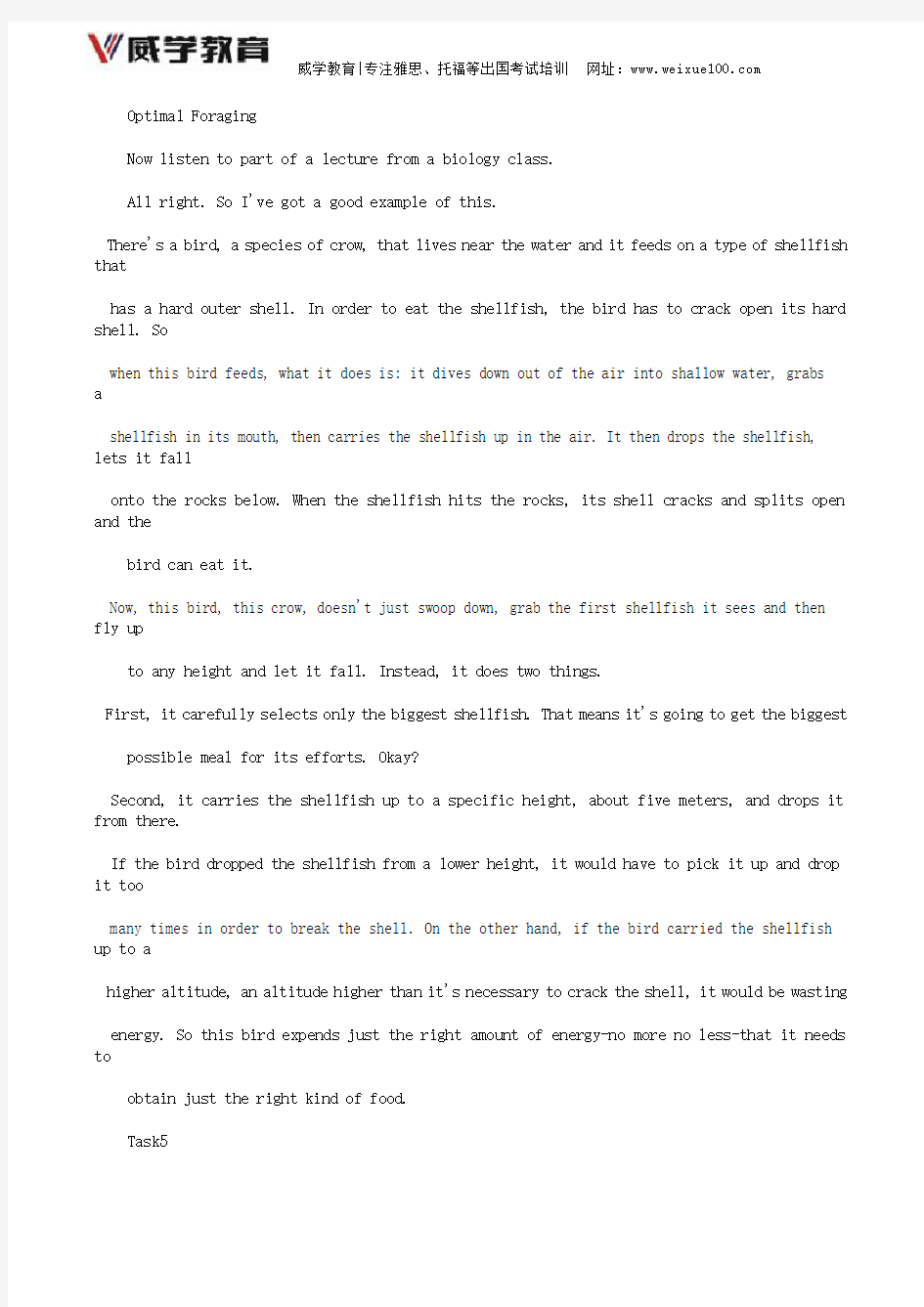【威学教育】托福口语TPO48综合体听力文本


托福口语TPO48综合体听力文本
TPO48
Tpo48
Task3
Listen to two students discussing the letter.
Did you see this letter?
Yeah. It's a nice idea, but it'll never happen.
Why do you say that?
Well, first of all, you can get on a bus right here on campus and in half an hour, you are
downtown at the county art museum.
That's true.
And if you show you student ID card, it only costs like two bucks to get in.
Yeah. In fact, on Mondays, students get in for free.
Right. And you can see some of the greatest art in the world there. For example, you know
Rembrandt, the famous Dutch painter?
Yeah.
Well, right now they're showing something like twenty of his paintings
Wow.
Yeah. And you know, it's true. We do have a lot of very generous alumni. But we're already asking
them for help building a new student center and a new library. And those are both very
expensive projects.
Yeah. That's right.
So I don't think we can expect them to donate much money for anything else anytime soon,
especially for something we don't really need.
Task4
Optimal Foraging
Now listen to part of a lecture from a biology class.
All right. So I've got a good example of this.
There's a bird, a species of crow, that lives near the water and it feeds on a type of shellfish that
has a hard outer shell. In order to eat the shellfish, the bird has to crack open its hard shell. So
when this bird feeds, what it does is: it dives down out of the air into shallow water, grabs a
shellfish in its mouth, then carries the shellfish up in the air. It then drops the shellfish, lets it fall
onto the rocks below. When the shellfish hits the rocks, its shell cracks and splits open and the
bird can eat it.
Now, this bird, this crow, doesn't just swoop down, grab the first shellfish it sees and then fly up
to any height and let it fall. Instead, it does two things.
First, it carefully selects only the biggest shellfish. That means it's going to get the biggest
possible meal for its efforts. Okay?
Second, it carries the shellfish up to a specific height, about five meters, and drops it from there.
If the bird dropped the shellfish from a lower height, it would have to pick it up and drop it too
many times in order to break the shell. On the other hand, if the bird carried the shellfish up to a
higher altitude, an altitude higher than it's necessary to crack the shell, it would be wasting
energy. So this bird expends just the right amount of energy-no more no less-that it needs to
obtain just the right kind of food.
Task5
Listen to a conversation between two students.
Hey. Cindy. You look happy. Making plans for the summer vacation?
I'm just glad the semester is finally over. I just finished my final exam, so I'm taking off for
summer vacation tomorrow. Aren't you?
I wish.
What do you mean?
I have to rewrite the lab report for my biology class. I guess I did it all wrong. So the professor's
making me rewrite it before he'll submit a final grade.
I guess that's better than if he just gave you a bad grade on it, right?
I guess so. But I was planning on leaving town tomorrow too, and now I'm not sure I can. I spoke
with the professor and he gave me two options. I can either turn in the revised report in one
week and get my grade, or he said I can wait, you know, taking incomplete in the class and submit
the paper next semester in the fall.
So are you going to stay around to revise the report?
I could. I'd get the grade for the class on time and I wouldn't have to think about it anymore. But
there's a family reunion this weekend. I was really looking forward to it. IfI stay around to revise
the report, I'll miss the reunion.
Well, maybe you should take your time and work on the report over the summer. You can submit
it when you return in the fall semester and get your grade then.
That would be fine, but what if I need materials from the library to revise the report? I don't
know if I’II be able to find the materials at the library at home.
Hmm…
Task6
Listen to part of a lecture in a business class.
Okay. So we have been discussing how companies use advertising to help sell their products. Now
although advertisements can benefit companies, there are people who are critical of advertising
because of certain environmental problems it can cause. So let's talk about two ways advertising
can be seen to negatively affect the environment.
One way is by wasting natural resources, like trees, by advertising to consumers who do not have
a need for the product or service. The advertisement is irrelevant or useless for them. For
instance, a piece of mail I got advertising a kitchen renovation service. A whole big booklet, lots
of paper, about different ways to remodel your kitchen: changing the floors, adding new
cupboards or appliances, but this was all a lot of wasted paper, wasted trees because I don't even
own my place. I rent an apartment. So a kitchen renovation service is irrelevant to me. I can't use
it. And I'm sure that booklet was mailed to lots of other people who also rent and who just threw
the booklet into trash because they have no need for a kitchen renovation.
Now, additionally, advertising can have a negative effect on the natural beauty of the
environment. People are often less able to enjoy the beauty of the natural surroundings if there
are large advertisements blocking their view of the landscape or distracting them from the
natural beauty around them. Let's face it. No matter how beautiful an area of nature is to begin
with, its beauty is damaged by visible advertisements. So...like, for example, this happens with
big advertisements on the side of roads, huge billboards. Say there's a road passing through a
beautiful area in the mountains, but there are all these big billboards advertising restaurants and
products along the side of the road. The land is naturally very beautiful, but you can't fully
appreciate it. The big billboard advertisements get in the way.
